七年级人教版英语下册第11课知识点复习
人教版 七年级英语下册 Unit 11 知识点详解
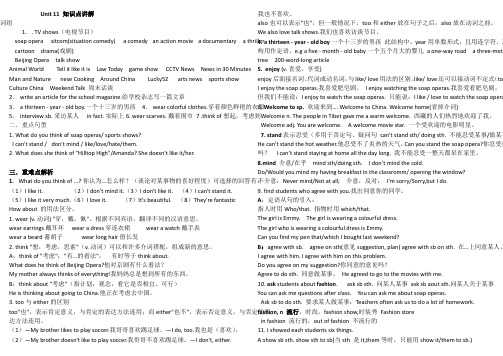
Unit 11 知识点讲解元词组1.. TV shows(电视节目)soap opera sitcom(situation comedy) a comedy an action movie a documentary a thriller cartoon drama(戏剧)Beijing Opera talk showAnimal World Tell it like it is Law Today game show CCTV News News in 30 MinutesMan and Nature nese Cooking Around China Lucky52 arts news sports showCulture China Weekend Talk 周末话谈2. write an article for the school magazine.给学校杂志写一篇文章3. a thirteen - year - old boy.一个十三岁的男孩4. wear colorful clothes.穿着颜色鲜艳的衣服5. interview sb. 采访某人 in fact. 实际上6. wear scarves. 戴着围巾7 .think of 想起,考虑到二.重点句型1. What do you think of soap operas/ sports shows?I can't stand / don't mind / like/love/hate/them.2. What does she think of "Hilltop High"/Amanda? She doesn't like it/her.三.重难点解析1. What do you think of ...? 你认为...怎么样?(谈论对某事物的喜好程度)可选择的回答有:(1)I like it. (2)I don't mind it.(3)I don't like it. (4)I can't stand it.(5)I like it very much.(6)I love it. (7)It's beautiful. (8)They're fantasticHow about 的用法区分。
七年级下册英语unit11知识点总结
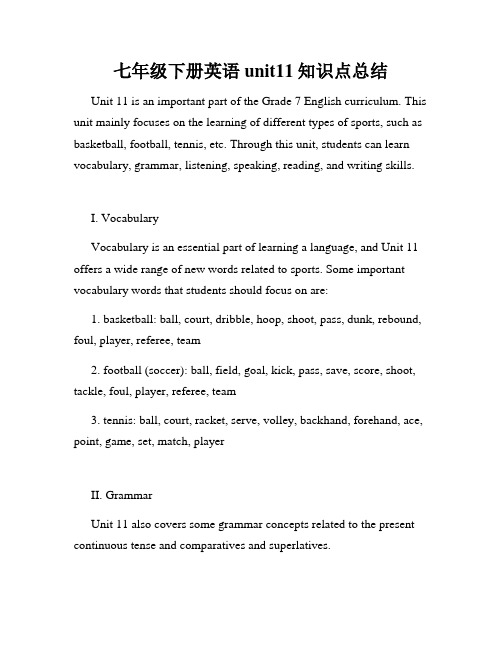
七年级下册英语unit11知识点总结Unit 11 is an important part of the Grade 7 English curriculum. This unit mainly focuses on the learning of different types of sports, such as basketball, football, tennis, etc. Through this unit, students can learn vocabulary, grammar, listening, speaking, reading, and writing skills.I. VocabularyVocabulary is an essential part of learning a language, and Unit 11 offers a wide range of new words related to sports. Some important vocabulary words that students should focus on are:1. basketball: ball, court, dribble, hoop, shoot, pass, dunk, rebound, foul, player, referee, team2. football (soccer): ball, field, goal, kick, pass, save, score, shoot, tackle, foul, player, referee, team3. tennis: ball, court, racket, serve, volley, backhand, forehand, ace, point, game, set, match, playerII. GrammarUnit 11 also covers some grammar concepts related to the present continuous tense and comparatives and superlatives.1. Present continuous tense: This tense is used to describe actions that are happening at the moment of speaking. For example: I am playing basketball with my friends now.2. Comparatives and superlatives: These are adjectives used to compare things. The comparative form is used to compare two things, and the superlative form is used to compare three or more things. For example: Basketball is more popular than football. Basketball is the most popular sport in our school.III. Listening and SpeakingListening and speaking skills are crucial for effective communication in English. Unit 11 includes listening and speaking exercises that help students improve their skills in these areas. Students can practice their listening and speaking skills by:1. Listening to dialogues and conversations about sports2. Answering questions about sports-related topics3. Participating in speaking activities, such as group discussions, role-plays, and debatesIV. Reading and WritingReading and writing skills are important for developing students' comprehension and communication skills. Unit 11 provides reading and writing exercises that help students improve their skills in these areas. Students can practice their reading and writing skills by:1. Reading articles about different sports2. Writing short paragraphs about their favorite sports3. Completing worksheets and quizzes related to sportsIn conclusion, Unit 11 is an essential part of the Grade 7 English curriculum that focuses on sports-related vocabulary, grammar, listening, speaking, reading, and writing skills. With the help of this unit, students can enhance their English language skills and achieve proficiency in sports-related communication.。
Unit11讲义人教版英语七年级下册
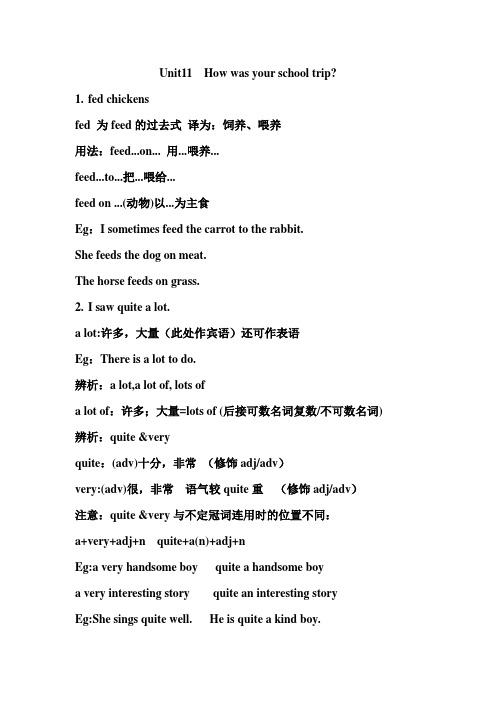
Unit11 How was your school trip?1.fed chickensfed 为feed的过去式译为:饲养、喂养用法:feed...on... 用...喂养...feed...to...把...喂给...feed on ...(动物)以...为主食Eg:I sometimes feed the carrot to the rabbit.She feeds the dog on meat.The horse feeds on grass.2.I saw quite a lot.a lot:许多,大量(此处作宾语)还可作表语Eg:There is a lot to do.辨析:a lot,a lot of, lots ofa lot of:许多;大量=lots of (后接可数名词复数/不可数名词) 辨析:quite &veryquite:(adv)十分,非常(修饰adj/adv)very:(adv)很,非常语气较quite重(修饰adj/adv)注意:quite &very与不定冠词连用时的位置不同:a+very+adj+n quite+a(n)+adj+nEg:a very handsome boy quite a handsome boya very interesting story quite an interesting storyEg:She sings quite well. He is quite a kind boy.This kind of fruit is very healthy. Thank you very much.3.Did you learn anything?辨析:anything&somethinganything:(不定代词)任何事物;某事物(常用于否定句/疑问句中) something:(不定代词)某事(常用于肯定句中) 但是在表示请求、建议、或征求意见的疑问句中常用something注意:(1)adj修饰不定代词,要位于其后(2)不定代词作主语时,谓语动词用单数形式(3)补充其他不定代词some any no every/body thing oneEg:There isn’t anything wrong.There is something wrong with my puter.4.The farmer showed Carol around the farm.farmer:(n)农民farm:(n)农场;(v)干农活farming:(不可数n)农事Eg:The farmers are working on the farm,and there is too much farming.show sb.around...带某人到处参观...Eg:The guide shows us around the museum.与show相关的短语:show sb.sth=show sth.to sb.给...看展示on show 展览show off 炫耀show up出现5.The farmers don’t grow apples.grow:(vt)种植;栽培(vi)生长;发育Eg:Farmers in the south of China mainly grow rice.Everything begins to grow in spring.短语:grow up成长,长大grow into成长为;发展成(由一种情况变成另外一种情况)Eg:I want to be a guide when I grow up.She grows into a lovely girl.辨析:grow&plantgrow: 种植(强调过程/状态)plant:(v)种植(仅表示栽入土中,表示动作)(n)植物Eg:The farmers grow a lot of trees every year.The farmers plant lots of trees every year.There are many different plants in the garden.6....we worried it would rain.worry:(vt)担心;担忧后常接宾语从句Eg:His parents worry that their child will sick.(vt)使担心;使发愁(常接sb.作宾语)Eg:The naughty boy worries his parents.worry about sb./sth.=be worried about sb./sth. 担心某人/某事Eg:Don’t worry about me ./Don’t be worried about me.7.Luckily,it didn’t,and the sun came out again.(1)luckily(adv)幸运地常用于句首,用逗号隔开unluckily不幸地unfortunately fortunate(adj)幸运的fortunately(adv)幸运地以辅音字母+y结尾的形容词变成副词的方法:改y为i再加ly Eg:happy lucky busy angry easy(2)sun moon earth star 都是世界上独一无二的事物,前面必须加the(3)e out出来;发芽;开花;出版与e相关的短语:e from来自 e on加油;快点 e back 回来e down 下来 e in 进来 e up with 提出;想出;赶上e across遇到8.expensive/cheapexpensive/cheap只能形容事物的贵贱;当谈论价格(price)时,只能用high/lowEg:The pen is cheap.=The price of the pen is low.9.All in all,it was an exciting day.all in all:总的来说;总之in a word:简言之in short:总之Eg:All in all, it’s good for you to do more exercise.辨析:all in all, in all,at allall in all:总的来说(常用于句首)eg:All in all, we had a good time. in all:总共;合计(句首/句末)eg:There are fifty students in all.at all:根本常用于“not at all”根本不Eg:He doesn’t like apples at all.与all相关的短语:all the time 一直after all 毕竟10.I didn’t like the trip at all.Not at all 用于回答感谢/道歉Eg:Thank you very much.Not at all.其它的回答:It’s my pleasure. It’s a pleasure. No problem.You’re wele. That’s all right. That’s OK.一般过去时态含义:表示过去某个时间发生的动作或存在的状态,也表示过去经常或反复发生的动作。
人教版七年级的下册的英语Unit11学习的知识点的.doc
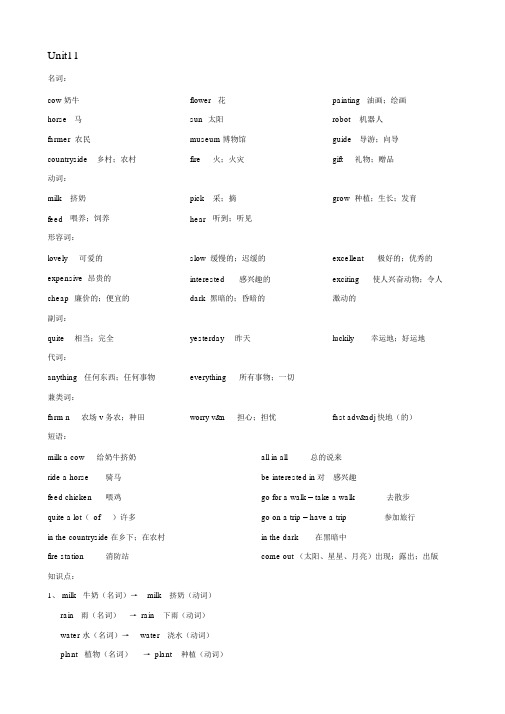
Unit11名词:cow 奶牛flower 花painting 油画;绘画horse 马sun 太阳robot 机器人farmer 农民museum 博物馆guide 导游;向导countryside 乡村;农村fire 火;火灾gift 礼物;赠品动词:milk 挤奶pick 采;摘grow 种植;生长;发育feed 喂养;饲养hear 听到;听见形容词:lovely 可爱的slow 缓慢的;迟缓的excellent 极好的;优秀的expensive 昂贵的interested 感兴趣的exciting 使人兴奋动物;令人cheap 廉价的;便宜的dark 黑暗的;昏暗的激动的副词:quite 相当;完全yesterday 昨天luckily 幸运地;好运地代词:anything 任何东西;任何事物everything 所有事物;一切兼类词:farm n 农场 v 务农;种田worry v&n 担心;担忧fast adv&adj快地(的)短语:milk a cow 给奶牛挤奶all in all 总的说来ride a horse 骑马be interested in对感兴趣feed chicken 喂鸡go for a walk = take a walk 去散步quite a lot(of)许多go on a trip = have a trip 参加旅行in the countryside在乡下;在农村in the dark 在黑暗中fire station 消防站come out (太阳、星星、月亮)出现;露出;出版知识点:1、 milk牛奶(名词)→milk挤奶(动词)rain雨(名词)→ rain下雨(动词)water 水(名词)→water浇水(动词)plant植物(名词)→ plant种植(动词)2、 feed 喂养;饲养Can you help me feed my dog 你能帮我喂狗吗( 1) feed to 把喂给You can feed nuts to the monkey. 你可以把坚果喂给这个猴子吃。
新目标人教版英语七下unit11知识点总结
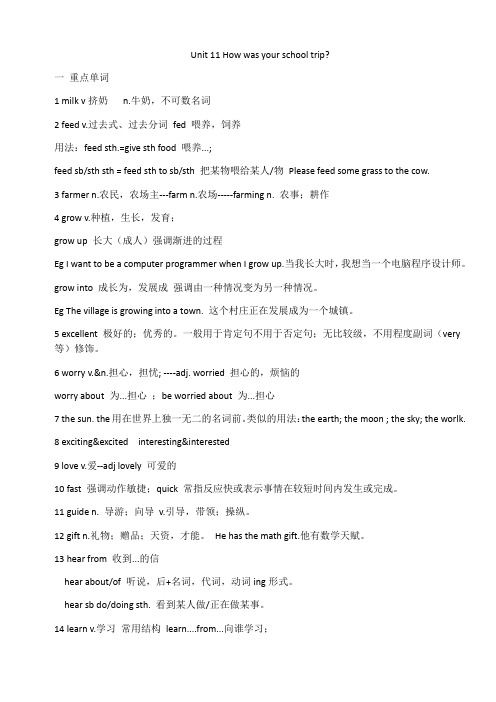
Unit 11 How was your school trip?一重点单词1 milk v挤奶n.牛奶,不可数名词2 feed v.过去式、过去分词fed 喂养,饲养用法:feed sth.=give sth food 喂养...;feed sb/sth sth = feed sth to sb/sth 把某物喂给某人/物Please feed some grass to the cow.3 farmer n.农民,农场主---farm n.农场-----farming n. 农事;耕作4 grow v.种植,生长,发育;grow up 长大(成人)强调渐进的过程Eg I want to be a computer programmer when I grow up.当我长大时,我想当一个电脑程序设计师。
grow into 成长为,发展成强调由一种情况变为另一种情况。
Eg The village is growing into a town. 这个村庄正在发展成为一个城镇。
5 excellent 极好的;优秀的。
一般用于肯定句不用于否定句;无比较级,不用程度副词(very 等)修饰。
6 worry v.&n.担心,担忧; ----adj. worried 担心的,烦恼的worry about 为...担心;be worried about 为...担心7 the sun. the用在世界上独一无二的名词前。
类似的用法:the earth; the moon ; the sky; the worlk.8 exciting&excited interesting&interested9 love v.爱--adj lovely 可爱的10 fast 强调动作敏捷;quick 常指反应快或表示事情在较短时间内发生或完成。
11 guide n. 导游;向导v.引导,带领;操纵。
Unit 11 单元知识点复习课件 人教版七年级英语下册

5. quite a lot 相当多;许多 ✓ quite 作副词,意为“相当;完全”。 ✓ a lot 后面不能直接跟名词,a lot of 相当于lots of,其后可接可数名词复数或不可数名词。 ✓ quite a lot意为“许多”,如果后面接名词, 则用quite a lot of。
【辨析】quite与very
walk作动词,“走路;散步”,后接地点名 词时,要加上介词to,其后接here,there,home 等地点副词时,不加介词to。
Your home is near the school, so you can walk home. We walk to school every day.
2. milked a cow 给奶牛挤奶 ✓ milk 在此处作动词,意为“挤奶”。
拓展not at all单独使用时的用法: ① 可作为当别人表示感谢的应答语,意为“不
客气;不用谢”。 — Thank you very much. — Not at all.
② 可作为别人称赞或带感谢性质的客套语,意 为“别客气”。 — It’s very kind of you. — Not at all.
含义
总的来说
all in all
总共,合计
句子位置/适用句型
常用于句首 句首或句末
in all at all
根本
常用于否定句中 not (…) at all 根本不
他们总共筹集了一万元。 They raised 10,000 yuan _i_n_a_l_l__.
总的来说,她是一位优秀的老师。 __A_ll__in__a_ll_, she is an excellent teacher.
_________ .
人教版七年级英语下Unit11How was your school trip知识点复习

不太好。
It was very bad/terrible.很糟糕。
43.How was your trip last week?你上周的旅行怎么样?
How&物的情况?
答语:It was good/great.很好。 It was OK.还可以。
It was not bad.不错。
It was not very good.
11.talk with a farmer 12.take a photo/take photos 拍照,摄影 13.something interesting 一些有趣的事 14.show sb. around 带领某人参观 15.learn...about 学习;知道;了解 16.grow (grew) strawberries 种草莓
1. milk a cow 挤牛奶 2.a glass of milk 一杯牛奶 3. ride a horse 骑马 4.feed chickens 喂鸡 5.feed … with …表示“用……喂…
6..on the farm. 7.quite a lot 许多;相当多 8.in the countryside 在乡下;在农村 9.be worried about 担心... 与worry about同义 10.go for a walk 去散步
too much“太多” 修饰不可数名词 too much water太多水 much too “太...” 修饰形容词或副词 39.not… at all一点也不;根本不 not at all 不用谢,不客气
40.复合不定代词everything做主语时谓动词用单数 41.疑问词+动词不定式(to do sth.) 42.It is + adj. (for sb.)to do sth. 对于(某人来说)做某事是...的
人教版七年级下册英语Unit-11单元知识点复习

人教版七年级下册英语Unit-11单元知识点复习Unit 11 How was your school trip?1. milk n . 牛奶v. 挤奶milk a cow给奶牛挤奶2. ride (rode . ridden )v 骑n 旅程eg 1) 骑车大约十分钟路程。
(七下U3)It's about ten minutes' ride.2) 乘公交车(的旅程)要花大约20分钟。
The bus ride takes about 20 minutes.3. feed (fed, fed) 1) vt 喂养;饲养①feed chickens喂鸡②feed my dog喂我的狗2)feed ....to..... 把...喂给...吃3)feed on以...为食eg. 绵羊以草为主食Sheep feed on the grass.farm vi 耕种;务农n农场,饲养场on the farm在农场eg. 他爸爸在山西务农。
His father farms in Shanxifarming 农业;务农eg.他了解很多农事。
He learned a lot about farming.farmer 农民;农场主farmland 农田4. quite adv 相当;完全;非常very adv 非常;很(语气比quite重)1)quite a lot相当多,非常eg. 我非常喜欢我的英语老师。
I like my English teacher quite a lot. (2) quite a lot of相当多的;许多= quite a feweg 1) 农场上有相当多的奶牛There are quite a lot of cows on the farm.2)----你看到奶牛了吗?----是的,看到了。
我看到了相当多。
---Did you see any cows?---Yes, I did. I saw quite a lot.5. anything任何事物;某物everything所有事物;一切something某物nothing 什么都没有复合不定代词1)作主语时,视为单三。
